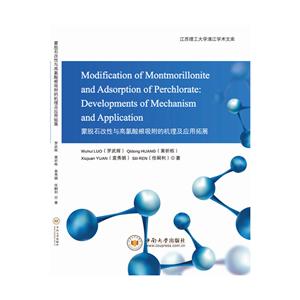Contents
CHAPTER 1
Introduction
1.1 Perchlorate: source, chemistry and distribution
1.2 Transport of perchlorate in nature
1.3 Toxicity and regulatory standard
1.4 Technologies for removal of perchlorate
1.4.1 Biodegradation
1.4.2 Chemical reduction
1.4.3 Physical transfer
1.5 Unmodified and organo-modified montmorillonite
1.5.1 Unmodified montmorillonite
1.5.2 Modification of montmorillonite
1.5.3 Synthesis of organo-montmorillonite
1.6 Application of organo-montmorillonite
1.7 Removal of perchlorate and related species by organo-montmorillonite
1.8 Objectives and outline of this book
CHAPTER 2
Adsorption Models and Characterizations
2.1 Materials and reagents
2.2 Solid characterizations
2.3 Quantification of substances in aqueous solution
2.4 Adsorption kinetics models
2.5 Adsorption isotherm models
2.5.1 Single-component system
2.5.2 Multi-component system
2.6 Thermodynamics
2.7 Selectivity coefficient
2.8 Error functions
CHAPTER 3
Effect of Molecular Structure of Surfactant on Perchlorate Removal by Various Organo-montmorillonites
3.1 Modification of montmorillonite using various alkyl quaternary ammonium salts
3.2 Adsorption experiments
3.3 Characterizations of organo-montmorillonite
3.4 Adsorption capacity of perchlorate on organo-montmorillonites
3.5 Adsorption kinetic of perchlorate on organo-montmorillonites
3.6 Adsorption selectivity of perchlorate on organo-montmorillonites
3.7 Conclusions
CHAPTER 4
Surfactant-Modified Montmorillonite by Benzyl Octadecyl Dimethyl Ammonium Chloride for Removal of Perchlorate
4. 1 Preparation of benzyl octadecyl dimethyl ammonium-modified montmorillonite
4.2 Adsorption experiments
4.3 X-ray diffraction
4.4 FTIR spectroscopy
4.5 TG-DTA analyses
4.6 Zeta potential analyses
4.7 FESEM observation and EDX analyses
4.8 Adsorption characteristics
4.8.1 Adsorption isotherms
4.8.2 Effect of temperature
4.8.3 Effect of initial solution pH
4.8.4 Effect of adsorption time
4.8.5 Effects of co-existing anions
4.9 Influence of modifier dosage on its distribution and perchlorate uptake
4.10 Conclusions
CHAPTER 5
Optimization of Hexadecyl Pyridinium-Modified Montmorillonite for Removal of Perchlorate Based on Adsorption Mechanisms
5.1 Preparation of hexadecyl pyridinium-modified montmorillonite and adsorption of perchlorate: in-situ and ex-situ strategies
5.2 Uptake of hexadecyl pyridinium on montmorillonite
5.3 Uptake of perchlorate and release of hexadecyl pyridinium
5.4 Solid characterizations
5.5 Isotherms and thermodynamics of perchlorate adsorption
5.6 Kinetics of perchlorate adsorption
5.7 Mechanisms of adsorption optimization
5.8 Conclusions
CHAPTER 6
Selective Adsorption of Inorganic Anions on Unwashed and Washed Hexadecyl Pyridinium-Modified Montmorillonite
6. 1 Synthesis of unwashed and washed hexadecyl pyridinium-modified montmorillonite and adsorption tests
6. 2 Selectivity coefficient for anion adsorption on hexadecyl pyridinium-modified montmorillonite
6.3 pH and Eh of equilibrium solution
6.4 Adsorption of anions by hexadecyl pyridinium-modified montmorillonites
6.5 Relationships of adsorption capacity and selectivity with anionic radius and hydration energy
6.6 X-ray diffraction
6.7 Mechanism of selective adsorption of anion on hexadecyl pyridinium-modified montmorillonite
6.8 Conclusions
CHAPTER 7
Synergistic Effect of Sr2 and ReO4− Adsorption on Hexadecyl Pyridinium-Modified Montmorillonite
7. 1 Modification of montmorillonite by hexadecyl pyridinium in the specific dosage
7.2 Adsorption of strontium and perrhenate ions
7.3 Contents of hexadecyl pyridinium and uptakes of strontium and perrhenate ions on modified montmorillonites
7.4 Adsorption isotherms for strontium and/or perrhenate ions on optimized modified montmorillonite
7.5 Characterization of the solid residues after adsorption of strontium and/or perrhenate ions on optimized modified montmorillonite
7.6 Mechanism of simultaneous adsorption
7.7 Conclusions
CHAPTER 8
Synergistic Effect of ClO4- and Sr2 Adsorption on Alginate-Encapsulated Organo-Montmorillonite Beads: Implication for Radionuclide Immobilization
8. 1 Preparation of organo-montmorillonite/alginate beads
8.2 Adsorption experiment of perchlorate and/or strontium ions
8.3 Adsorption characteristics of perchlorate and/or strontium ions on the organo-montmorillonite/alginate beads
8.3. 1 Influence of solution pH
8.3. 2 Adsorption kinetics
8.3. 3 Adsorption isotherms
8.4 Characterization of the organo-montmorillonite/alginate beads before and after perchlorate and/or strontium ions adsorption
8.5 Extended application of organo-montmorillonite/alginate beads
8.6 Conclusions
References


















